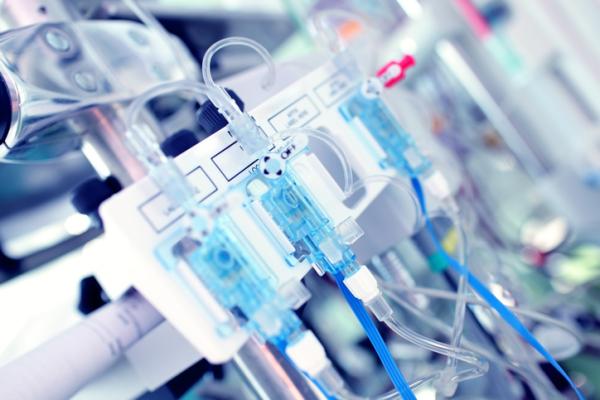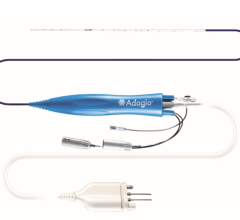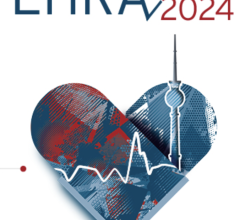
Getty Images
August 31, 2023 — Early extracorporeal life support (ECLS) does not improve survival in patients with acute myocardial infarction complicated by cardiogenic shock who are scheduled for early revascularization, according to late breaking research presented in a Hot Line session at ESC Congress 2023.1
Cardiogenic shock is the leading cause of death in hospitalized patients with acute myocardial infarction.2 Evidence-based treatment is limited to immediate revascularization of the culprit lesion.3-5 However, mortality remains high, reaching 40-50% within 30 days.2 Ongoing efforts to improve outcomes have led to an increase in the use of active mechanical circulatory support devices to achieve hemodynamic stabilization in severe shock. In particular, the use of venoarterial extracorporeal membrane oxygenation (VA-ECMO), also called ECLS, has risen by more than 10 times in recent years.6
ECLS enables full circulatory and respiratory support, which differentiates it from other devices. However, evidence for ECLS in patients with cardiogenic shock and acute myocardial infarction is restricted to observational studies and three small randomized trials.7-10 The potential benefits of hemodynamic support might be outweighed by a considerable risk of device-associated local and systemic complications including bleeding, stroke, limb ischemia and hemolysis.
ECLS-SHOCK was the first randomized trial to investigate the effect of ECLS on mortality in patients with acute myocardial infarction complicated by cardiogenic shock.11 A total of 420 patients with acute myocardial infarction and cardiogenic shock scheduled for early revascularization were enrolled from 44 centers in Germany and Slovenia. The median age of participants was 63 years and 19% were women. Patients were randomly assigned to early ECLS plus usual medical treatment (ECLS group) or to usual medical treatment alone (control group).
The primary endpoint was all-cause death at 30 days. Secondary endpoints included length of mechanical ventilation, time to hemodynamic stabilization and need for renal replacement therapy. Safety endpoints included moderate or severe bleeding and peripheral vascular complications requiring intervention
A total of 417 patients were included in the final analyses. The primary endpoint of all-cause death at 30 days occurred in 100 of 209 patients (47.8%) in the ECLS group and in 102 of 208 patients (49.0%) in the control group (relative risk [RR], 0.98; 95% confidence interval [CI] 0.80 to 1.19; p=0.81).
The median duration of mechanical ventilation was longer in the ECLS group: 7 days (interquartile range [IQR] 4-12) in the ECLS group versus 5 days (IQR 3-9) in the control group, Hodges-Lehmann estimate of the difference between groups, 1 (95% CI 0 to 2). The time to hemodynamic stabilization and rates of renal replacement therapy were similar between treatment groups.
Regarding safety endpoints, moderate or severe bleeding occurred more frequently in the ECLS group: 23.4% of patients in the ECLS group versus 9.6% of patients in the control group (RR 2.44; 95% CI 1.50 to 3.95). Peripheral vascular complications requiring intervention occurred also more often in the ECLS group: 11.0% of patients in the ECLS group versus 3.8% of patients in the control group (RR 2.86; 95% CI 1.31 to 6.25).
Principal investigator Professor Holger Thiele of Leipzig Heart Centre at Leipzig University, Germany said: “The results of ECLS-SHOCK demonstrated no reduction in 30-day mortality with early ECLS therapy and an increase in complications. The findings may lead to the discontinued routine use of these devices in clinical practice.”
For more information: www.escardio.org
Find more ESC23 conference coverage here
References and notes
- ECLS-SHOCK will be discussed during Hot Line 3 on Saturday 26 August at 16:30 to 17:30 CEST in room Amsterdam.
- Thiele H, Ohman EM, de Waha-Thiele S, et al. Management of cardiogenic shock complicating myocardial infarction: an update 2019. Eur Heart J. 2019;40:2671-2683.
- Hochman JS, Sleeper LA, Webb JG, et al. Early revascularization in acute myocardial infarction complicated by cardiogenic shock. N Engl J Med. 1999;341:625-634.
- Thiele H, Akin I, Sandri M, et al. One-year outcomes after PCI strategies in cardiogenic shock. N Engl J Med. 2018;379:1699-1710.
- Thiele H, Akin I, Sandri M, et al. PCI strategies in patients with acute myocardial infarction and cardiogenic shock. N Engl J Med. 2017;377:2419-2432.
- Becher PM, Schrage B, Sinning CR, et al. Venoarterial extracorporeal membrane oxygenation for cardiopulmonary support. Circulation. 2018;138:2298-2300.
- Ostadal P, Rokyta R, Karasek J, et al. Extracorporeal membrane oxygenation in the therapy of cardiogenic shock: Results of the ECMO-CS randomized clinical trial. Circulation. 2023;147:454–464.
- Brunner S, Guenther SPW, Lackermair K, et al. Extracorporeal life support in cardiogenic shock complicating acute myocardial infarction. J Am Coll Card. 2019;73:2355-2357.
- Ouweneel DM, Schotborgh JV, Limpens J, et al. Extracorporeal life support during cardiac arrest and cardiogenic shock: a systematic review and meta-analysis. Intensive Care Med. 2016;42:1922-1934.
- Banning AS, Sabate M, Orban M, et al. Venoarterial extracorporeal membrane oxygenation or standard care in patients with cardiogenic shock complicating acute myocardial infarction: the multicentre, randomised EURO SHOCK trial. EuroIntervention. 2023 May 19;EIJ-D-23-00204. doi: 10.4244/EIJ-D-23-00204. Online ahead of print.
- Thiele H, Freund A, Gimenez MR, et al. Extracorporeal life support in patients with acute myocardial infarction complicated by cardiogenic shock - Design and rationale of the ECLS-SHOCK trial. Am Heart J. 2021;234:1–11.


 August 29, 2025
August 29, 2025 









